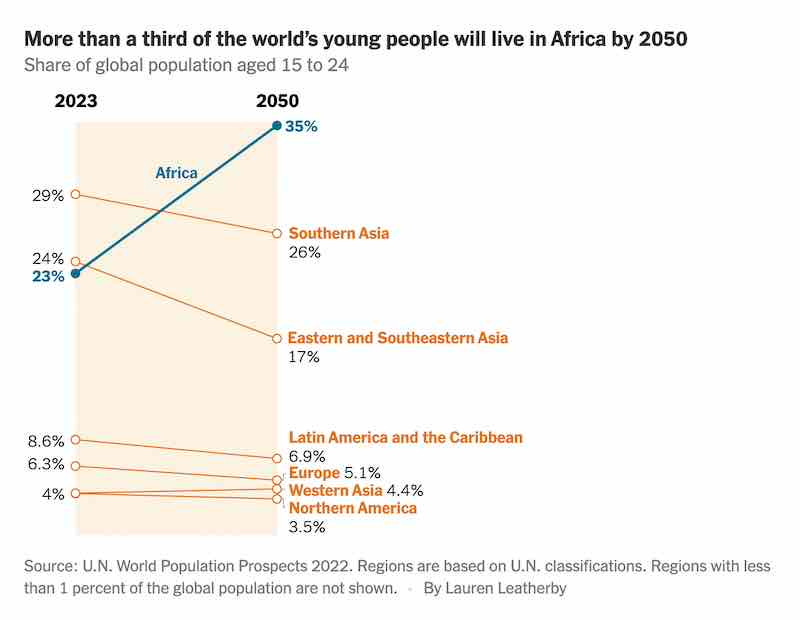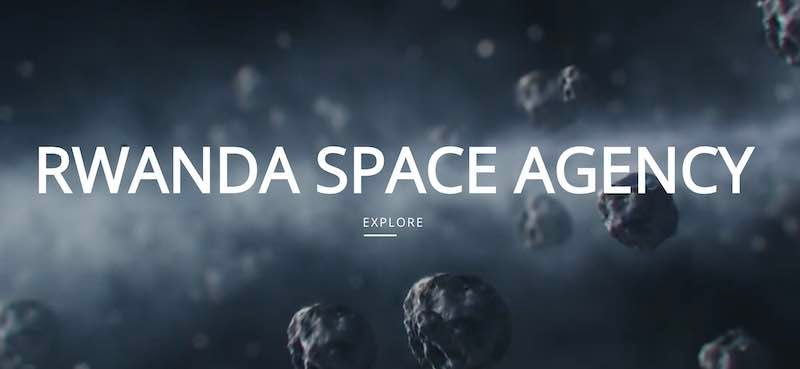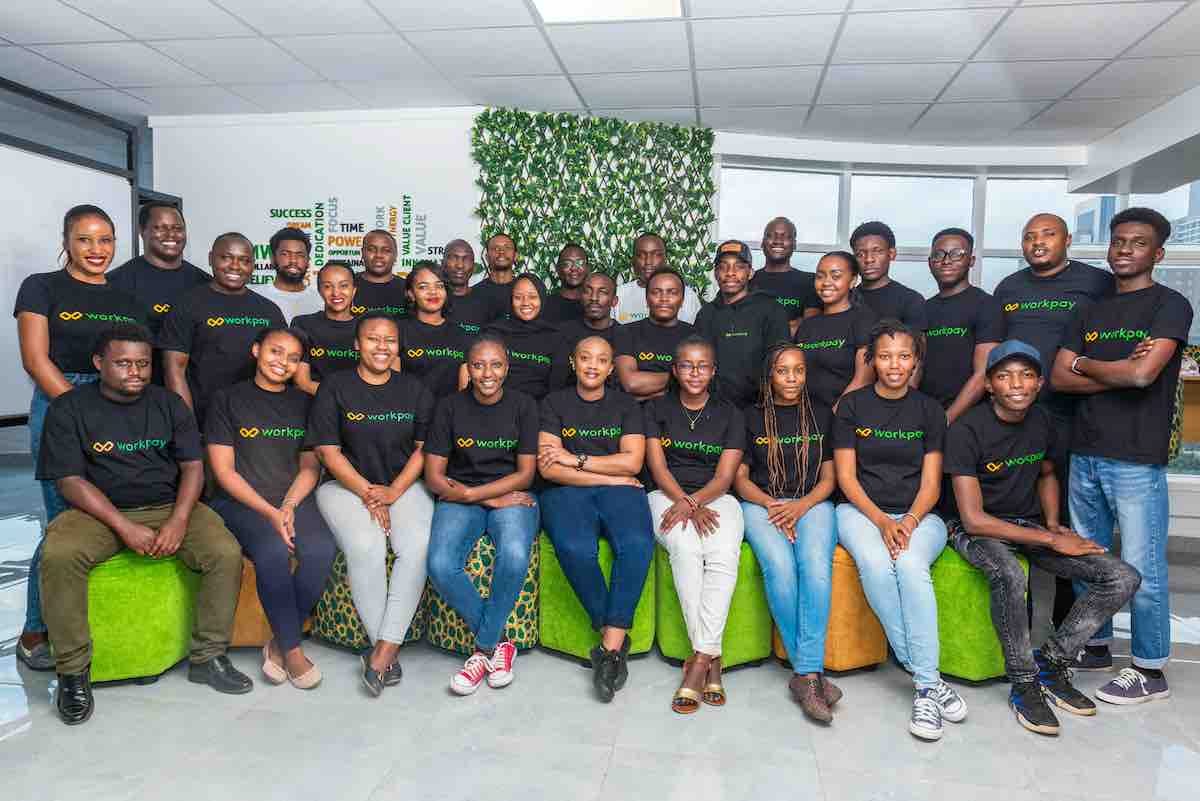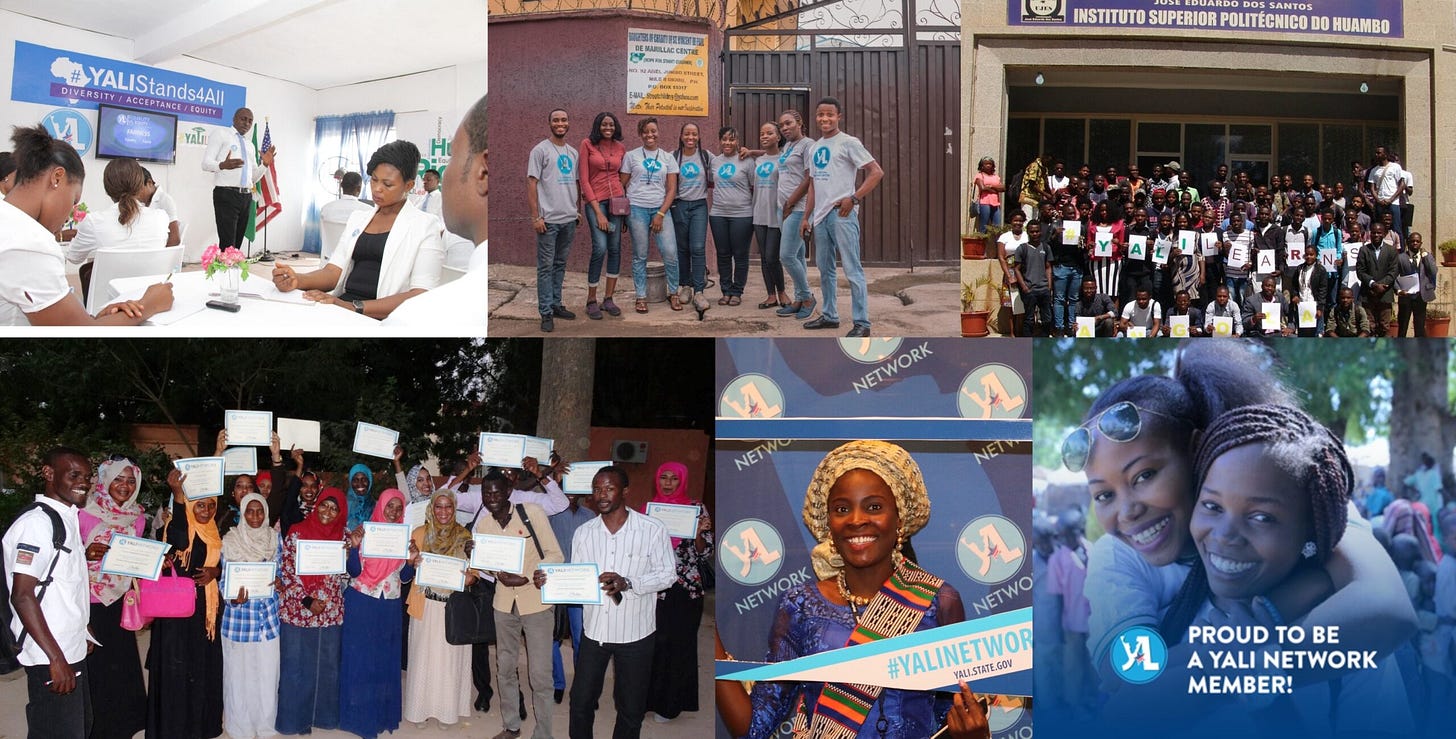Thiel Fellows, for Africa
Africa’s youthquake is a generational opportunity for diplomacy and technology innovation
If demography is destiny, then we should pay much more attention to young Africans.
Last week the White House shared its “brag sheet” of programs to accelerate the US-Africa partnership, and let’s give credit where it is due: Biden’s Africa policy is impressive. It is unprecedented in scale, including $55 billion in investment in Africa over three years. Biden’s infrastructure program in the Lobito Corridor and digital transformation efforts across the continent are both creative and strategic.1
But more could be done to cultivate ties with young Africans and to nurture technology innovation on the continent. And not all of this has to be led by the government. Personally, I’d love to see Thiel Fellows for Africa and other private efforts to help propel Africa’s future.
Consider the UN projections. By 2050, Africa’s population will increase by one billion people, to 2.5 billion.2 It is difficult to imagine a demographic that is more important to the future than the young Africans at the front end of this growth. The number of Africans under age 25 is more than ten times the size of American Baby Boomers.3
While the US and other developed nations grapple with aging populations, Africa’s youthquake is poised to reshape the global order. By 2050, one-third of all young people aged 15 to 25 in the world will be African. Africa will have the largest working population in the world, bigger than China’s and India’s. Think about that.
2050 may seem far off, but this future is just a few years more distant than 9/11 and Y2K. The time to build ties with the youngest, fastest growing population in the world — young Africans — is now. It is an incredible, urgent diplomatic opportunity.
Winning the hearts and minds of young Africans matters geopolitically. African countries have vast resources, a growing say in global affairs, and multiple paths they could take with government allies and adversaries. Africa’s stability matters to global stability.
I believe the greatest support we can provide young Africans is opportunity. In addition to political stability, this requires commercial advancement. Africa’s economies — plural, not singular — are shifting from agriculture and extraction to services, according to McKinsey.4 But productivity still lags. Africa will add 796 million people to the workforce by 2050. Where will these people work?
The African Union joined the Group of 20 in September. Education is on the rise, with 44 percent of young Africans graduating from high school in 2020. 570 million Africans use the Internet. Talented young Africans are primed and eager to build a brief future. We should support this population, particularly the most ambitious and talented innovators, entrepreneurs, and job creators among them.
What could this look like?
It might look like marketing outer space to young people in Africa, with corresponding educational programs. Not many people associate space with Africa, but the African space market is booming. More than 20 African nations now have space programs.5 Rwanda has the largest megaconstellation in the world, with 337,320 satellites.6 The Artemis Accords include Nigeria, Rwanda, and Angola. In 2017, the African Union created the African Space Program (AfSa) to create a governance model for space activities across the continent.
What better way to ignite the imagination of young Africans than space? Space-related diplomacy directed at young Africans is a way to inspire young people to pursue STEM education just as it did for Baby Boomers in the US. It’s also a way to promote a new grand narrative about technology innovation driving the future. With its diverse astronauts and international participation, NASA’s Artemis space program is ripe for promotion.
Marketing space in Africa could benefit its external image too, helping share the story of Africa’s space efforts across the globe. The soft power works in both directions, in other words.
Another idea is to create a program like the Thiel Fellowships but for Africans, perhaps in partnership with a private foundation. The Thiel Fellows program is a two-year, $100,000 grant for young Americans who want to build new things. About 20-30 young people are awarded it each year. The fellowship has been around for barely a decade — it started in 2011 — but it has already birthed companies worth more than $220 billion including Figma, Etherium, and others.7 Applying the model to Africa may look different, but the idea is the same: identify talented and ambitious young “builders” and empower them to pursue high-upside projects, providing them with resources, mentorship, and a network to support them. Don’t tell them what to build; let them pursue their own visions.
About a year ago, I did due diligence on a pan-African venture fund called Launch Africa Ventures. I did not invest but was very impressed. With its focus on seed and early-stage ventures, it seemed to play a role similar to the Silicon Valley accelerator YCombinator, which is already investing in African startups.8 The diligence opened my eyes to the African startup/venture market, which is nascent but full of incredible people and possibilities.
Why not create more cross-currents between the U.S. and African tech ecosystems? For example, the Commerce Department could organize roadshows of promising African startups. Incentives for venture capital investment in Africa could be created; regulatory friction eased. Hackathons, coding contests, and design competitions could increase connective tissue as well.
Building on successful programs like YALI would be smart, too. Short for the Young African Leaders Initiative, YALI is a program focused on developing leadership and entrepreneurial skills among young people in Africa.9 It was created in 2010 and led by USAID and the State Department. YALI has regional leadership centers at African universities in Nairobi, Dakar, Accra, and Pretoria, with virtual and in-person training programs in English, French, and Portuguese. The training programs take six-to-seven-week and are followed by professional development, including sector specific certifications, and networking opportunities for alumni. YALI also offers a Mandela Fellowship Opportunity that hand-picks fellows for a six-week leadership program and professional experiences in the U.S. In 2023, 700 Africans participated.
Perhaps YALI could be expanded further to promote technology innovation by adding new tracks on engineering, entrepreneurship, and design thinking. Private foundations could fund YALI-adjacent fellowships to places like the Stanford D:School, Harvard Business School, or Carnegie Mellon’s graduate engineering programs. An online community platform like Circle could be used to keep the YALI community connected long after the program.
Investing in educational ties between Americans and Africans could be smart, too. School kids in the U.S. could have pen pals and video calls with sister schools in Africa. High school and college exchange programs could increase. The benefits of increasing connective tissue between young Americans and Africans go both ways.
I’m sure there are other ways to empower young Africans and build positive relations. But rather than imaging their needs, why not ask them directly? Perhaps the most powerful programs we can undertake are those that support their ideas and efforts on the ground.
My favorite Winston Churchill quote is the one where he says, “The world was made to be wooed and won with youth.” There’s no doubt Africa’s youthquake is going to shape the world, and a lot is at stake. With smart outreach and diplomacy, Africa’s “demography is destiny” moment could be a significant step forward for America and the world.
Check out the Rwanda Space Agency








